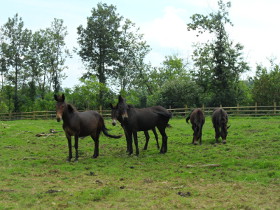When we speak of trade on this website, we usually refer to activities conducted within the law. Even where people break the law, there is at least some kind of legislative framework in place, albeit often insufficient to ensure minimum standards of animal welfare.
The story we are bringing to your attention today is of a different kind: smuggling.
The BBC website reports that cigarettes, fuel and other goods are regularly smuggled between Turkey and Iraq. In that perilous mountainous area, smugglers avoid carrying the goods themselves, choosing instead to train mules to reach the border and return on their own.
In order to combat this illegal trade, the Turkish army has decided not to penalise the smugglers on either side (in many cases people who apparently would not have any alternative source of income) but to punish the mules. Hundreds of them have already been shot.
As the BBC World Service’s Shahdi Alkashif reports from a Kurdish village, ‘for the villagers, the animals are more than just a means of transport. They are all named, and each animal’s personality and lineage is known to everyone. I could point to any mule and one of the local children could tell me which horse was its mother, and which donkey its father. “This mule is more important than my sons,” one man told me, with only a whiff of exaggeration. “He is one of the family.” Some villagers believe that smuggling has nothing to do with the deaths of their animals – the Turkish army simply want to terrorise their community.’
At a meeting with animal rights groups, the local governor ‘denied that the army had targeted the animals. The mules were frightened by gunfire and fell from the mountainside, he said, adding that the best thing the villagers could do if they were concerned about the animals would be to stop using them for smuggling.’
Is that really possible? The only certainties for now are that smuggling continues as ever, the Kurdish villagers feel under attack from their own government, and the mountains at the border between Turkey and Iraq are the setting for dreadful scenes of killing, where mules are shot and left to die, often after prolonged death throes.
You can read the full article on the BBC website. Please be aware that the report contains disturbing images.
Free subscription to the AnimalWelfareAndTrade Newsletter: click here
Follow AnimalWelfareAndTrade on Twitter: click here
Follow AnimalWelfareAndTrade on Facebook: click here


